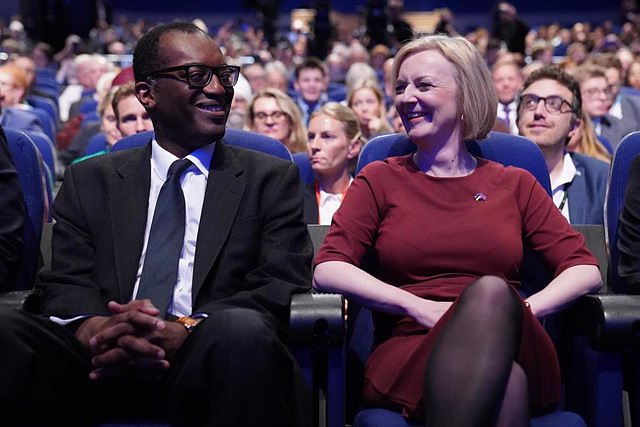MADRID, 3 Oct. (EUROPA PRESS) -
The British Government has rectified part of its tax reduction program and has ruled out eliminating the marginal rate of 45% that was taxed on income above 150,000 pounds (171,596 euros) per year and that affected 1.7% of taxpayers.
In a message posted on his Twitter social network account, British Finance Minister Kwasi Kwarteng has indicated that "the abolition of the 45% rate has become a distraction from our primary mission of tackling the challenges" of the country.
"We understand it and we have listened," added the minister, who has promised to go ahead with most of the tax reduction plan.
The elimination of the 45% marginal rate of income tax, which affects only those Britons who earn more than 150,000 pounds a year, was going to mean a loss of income for the public coffers of 2,065 million pounds (2,362 million euros ) to five years.
According to data from the Office for National Statistics, for the fiscal year 2021-2022, the marginal rate of 45% affects 563,000 Britons, which is equivalent to 1.7% of the nearly 32.7 million taxpayers who has the country.
Among the rest of the measures with which the British Government plans to continue, the reduction of the marginal rate from 20% to 19% is maintained, one percentage point less. In the first year of impact of this measure, tax revenues will fall by 5,270 million pounds (6,028 million euros). However, the British Executive expected that the increase in economic activity and employment would end up assuming a positive impact of 45 million pounds (51.5 million euros) over five years.
The main measures that will have the greatest impact on the British public treasury will be the cancellation of a rise in corporate tax from 19% to 25%, which was to come into force in April 2023 and was to raise up to 18,710 million (21,404 million euros) for 2026-2027. On its side, the reduction of 1.25 points in the country's Social Security contributions will have a negative impact of 15,250 million (17,446 million euros) over five years.
After the announcement of this partial correction, the pound has recovered the ground it had lost in the last week and a half. In its cross against the euro, it has reached 1.1477 euros, from 1.1390 where it closed on Friday and after having reached an intraday low of 1.1324 euros in the first trading hours.
Compared to the dollar, the British currency has been exchanged for 1.1281 'greenbacks', after having observed an intraday low of 1.1086 dollars in the first hour.
However, the impact on secondary debt markets has not been as pronounced. The 10-year British bond yield has reached a minimum of 3.969%, below the 4.200% observed on Friday and far from the maximum of almost 15 years last week, when it reached 4.591% before the Bank of England decided to intervene in the markets.

 Exploring Cardano: Inner Workings and Advantages of this Cryptocurrency
Exploring Cardano: Inner Workings and Advantages of this Cryptocurrency Seville.- Economy.- Innova.- STSA inaugurates its new painting and sealing hangar in San Pablo, for 18 million
Seville.- Economy.- Innova.- STSA inaugurates its new painting and sealing hangar in San Pablo, for 18 million Innova.- More than 300 volunteers join the Andalucía Compromiso Digital network in one month to facilitate access to ICT
Innova.- More than 300 volunteers join the Andalucía Compromiso Digital network in one month to facilitate access to ICT Innova.-AMP.- Ayesa acquires 51% of Sadiel, which will create new technological engineering products and expand markets
Innova.-AMP.- Ayesa acquires 51% of Sadiel, which will create new technological engineering products and expand markets The Ciudad Real Court sentences the man who killed a thief with two shots in his home to 6 years
The Ciudad Real Court sentences the man who killed a thief with two shots in his home to 6 years PP and PSOE clash in the Senate over Koldo's appearance after a socialist writing on a work plan
PP and PSOE clash in the Senate over Koldo's appearance after a socialist writing on a work plan FIFA and UEFA warn that "the protection and institutional stability of the RFEF must be prioritized"
FIFA and UEFA warn that "the protection and institutional stability of the RFEF must be prioritized" The parties close the Basque election campaign
The parties close the Basque election campaign How Blockchain in being used to shape the future
How Blockchain in being used to shape the future Not just BTC and ETH: Here Are Some More Interesting Coins Worth Focusing on
Not just BTC and ETH: Here Are Some More Interesting Coins Worth Focusing on Valencia displays its "innovative and technological potential" at the Emerge Americas event in Miami
Valencia displays its "innovative and technological potential" at the Emerge Americas event in Miami The CSIC incorporates the challenges of robotics, nanotechnology and AI in the new strategic plan for biomedicine
The CSIC incorporates the challenges of robotics, nanotechnology and AI in the new strategic plan for biomedicine Innovation allocates 9.1 million to train 74,000 people and guarantee digital inclusion
Innovation allocates 9.1 million to train 74,000 people and guarantee digital inclusion LIFE SPOT manages to develop new green treatments that eliminate groundwater contamination
LIFE SPOT manages to develop new green treatments that eliminate groundwater contamination A million people demonstrate in France against Macron's pension reform
A million people demonstrate in France against Macron's pension reform Russia launches several missiles against "critical infrastructure" in the city of Zaporizhia
Russia launches several missiles against "critical infrastructure" in the city of Zaporizhia A "procession" remembers the dead of the Calabria shipwreck as bodies continue to wash up on the shore
A "procession" remembers the dead of the Calabria shipwreck as bodies continue to wash up on the shore Prison sentences handed down for three prominent Hong Kong pro-democracy activists
Prison sentences handed down for three prominent Hong Kong pro-democracy activists ETH continues to leave trading platforms, Ethereum balance on exchanges lowest in 3 years
ETH continues to leave trading platforms, Ethereum balance on exchanges lowest in 3 years Investors invest $450 million in Consensys, Ethereum incubator now valued at $7 billion
Investors invest $450 million in Consensys, Ethereum incubator now valued at $7 billion Alchemy Integrates Ethereum L2 Product Starknet to Enhance Web3 Scalability at a Price 100x Lower Than L1 Fees
Alchemy Integrates Ethereum L2 Product Starknet to Enhance Web3 Scalability at a Price 100x Lower Than L1 Fees Mining Report: Bitcoin's Electricity Consumption Declines by 25% in Q1 2022
Mining Report: Bitcoin's Electricity Consumption Declines by 25% in Q1 2022 Oil-to-Bitcoin Mining Firm Crusoe Energy Systems Raised $505 Million
Oil-to-Bitcoin Mining Firm Crusoe Energy Systems Raised $505 Million Microbt reveals the latest Bitcoin mining rigs -- Machines produce up to 126 TH/s with custom 5nm chip design
Microbt reveals the latest Bitcoin mining rigs -- Machines produce up to 126 TH/s with custom 5nm chip design Bitcoin's Mining Difficulty Hits a Lifetime High, With More Than 90% of BTC Supply Issued
Bitcoin's Mining Difficulty Hits a Lifetime High, With More Than 90% of BTC Supply Issued The Biggest Movers are Near, EOS, and RUNE during Friday's Selloff
The Biggest Movers are Near, EOS, and RUNE during Friday's Selloff Global Markets Spooked by a Hawkish Fed and Covid, Stocks and Crypto Gain After Musk Buys Twitter
Global Markets Spooked by a Hawkish Fed and Covid, Stocks and Crypto Gain After Musk Buys Twitter Bitso to offset carbon emissions from the Trading Platform's ERC20, ETH, and BTC Transactions
Bitso to offset carbon emissions from the Trading Platform's ERC20, ETH, and BTC Transactions Draftkings Announces 2022 College Hoops NFT Selection for March Madness
Draftkings Announces 2022 College Hoops NFT Selection for March Madness


























